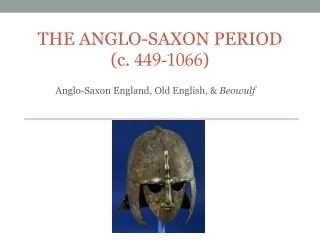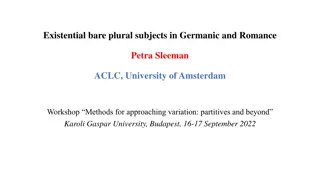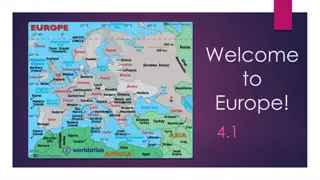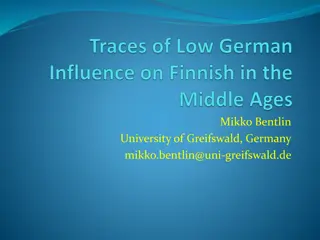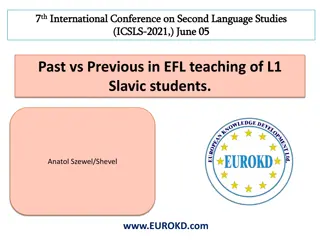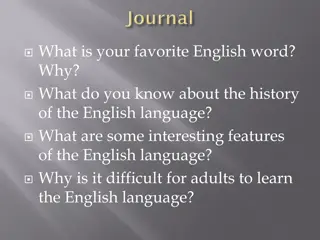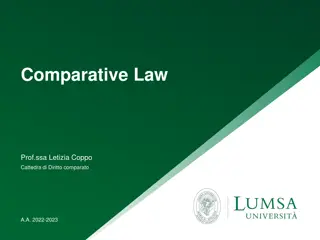The Anglo-Saxon Period: Migration and Integration in Angleland
The Anglo-Saxon period (c. 449-1066) in England saw a dynamic interplay of various cultures, including the Celts, Romans, and Germanic tribes. The arrival of Angles, Saxons, Jutes, and others led to the formation of Angleland (England), with societal structures based on heroic ideals like courage an
2 views • 20 slides
Exploring Germanic Tribes and Languages in History
Delve into the ancient Germanic tribes and languages, their territories, movements during the Migration Period, surviving languages, writing systems, and encounters with prominent historical figures like Roman generals. Learn about the earliest mentions of Germans by Greek travelers and astronomers,
3 views • 35 slides
The Etymology of Modern English Vocabulary: A Detailed Analysis
The etymology of modern English vocabulary explores words of native Anglo-Saxon origin, Germanic borrowings, and English elements, examining their characteristics and assimilation into the language. It delves into the ways borrowing occurs, criteria for assimilation, and the distinct layers comprisi
7 views • 15 slides
Contrasting Legal Systems Around the World
Explore the diverse legal families globally, such as Civil Law (Romano-Germanic) and Common Law (Anglo-American), along with their historical backgrounds, sources of law, and dominant ideologies. Delve into the distinctions between Civil Law and Common Law, their origins, development, and practical
0 views • 17 slides
Synagogue Poetry in Early Ashkenaz - The Song of the One II
Explore the historical events and literary responses to the persecution of Jews in Germanic lands during the summer of 1096. Discover the tragic martyrdom, forced conversions, and the collective trauma experienced by the Jewish communities in the Mainz, Worms, and Speyer regions. Delve into the Memo
0 views • 34 slides
Existential Bare Plural Subjects in Germanic and Romance Languages
Workshop explores the variation in using existential bare plural subjects in English, Dutch, Spanish, Italian, and other languages, presenting different linguistic analyses and theories regarding their occurrence across Germanic and Romance language families.
0 views • 49 slides
The Influence of Anglo-Saxon Language on Modern English
Explore the roots of Modern English in the Anglo-Saxon period, where Germanic tribes like the Angles, Saxons, and Jutes shaped the language, culture, and politics of the British Isles over 600 years. Discover how Old English, though different from present-day English, still influences a significant
1 views • 12 slides
Explore Europe: Geography, Culture, and History
Europe is a diverse continent with rich history, featuring major physical features like the Iberian Peninsula and the European Plain. The region is home to countries such as Spain, France, Italy, the United Kingdom, Ukraine, and Russia. European languages fall into three main categories - Germanic,
0 views • 7 slides
Influence of Low German on Swedish Development in the Baltic Region
The history of Finland in the 12th century, the incorporation into the Swedish realm, Christianization, and economic shifts due to Hanseatic League dominance are depicted. The chronology of Low German, its separate language development within the Germanic branch, and its decline with the Reformation
0 views • 12 slides
Challenges in EFL Teaching for Slavic L1 Learners
Slavic L1 learners of English face challenges due to the transfer of their native language's grammatical system. This study explores how the wording of grammatical explanations in English impacts students' conceptualization of grammar. It emphasizes the importance of proper instruction and highlight
0 views • 19 slides
Evolution of Indo-European Language: From Proto-Indo-European to Dutch
Explore the origins and development of the Indo-European language family, tracing its path from the Proto-Indo-European homeland to the emergence of Dutch. Discover key hypotheses such as the Anatolian and Kurgan theories, along with insights into the Germanic branch. Learn about Grimm's Law and the
0 views • 17 slides
Global Study of Cultural Dimensions in Leadership
Explore the comprehensive GLOBE study on cultural dimensions impacting leadership across 62 countries, highlighting values and practices in Germanic, Latin, and Anglo Europe. The research examines various aspects such as power distance, uncertainty avoidance, assertiveness, in-group collectivism, fu
0 views • 11 slides
Evolution of the English Language: From Celts to Anglo-Saxons
The English language has evolved from the ancient Celts through the Roman Empire and Anglo-Saxon invasions. Influences from Latin, Greek, and Germanic languages have shaped modern English. Explore the history and cultural impacts of these civilizations on the development of the English language.
0 views • 21 slides
Common Roots of Western Legal Tradition: Civil Law Evolution
Explore the evolution of civil law through the teaching of Roman law in universities, development of jus commune, Gregorian reform, and the divergence between Romanistic and Germanic legal families. Discover how the universities and scientia juris played a crucial role in shaping legal education and
0 views • 25 slides
